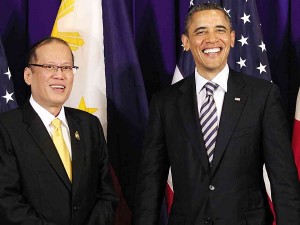No escaping China for Aquino, Obama
MANILA, Philippines—Defense cooperation, including China’s incursions into Philippine territory, will top the agenda of President Aquino’s meeting with US President Barack Obama during the latter’s two-day visit to the country next month.
In a radio interview, Ricky Carandang, head of the Presidential Communications Development and Strategic Planning Group, said Aquino and Obama will talk at length on defense cooperation, specifically the “rotational presence” of US troops in the country.
The meeting will be held on either Oct. 11 or 12.
“Whether or not we will sign something during the Obama visit is not something I can answer at this point. What I can assure our countrymen is that these discussions with the US will lead to enhanced security for the Philippines and that’s why we’re entering into these discussions,” Carandang said.
With the pivot of the United States toward East Asia, “our ties will continue to grow stronger,” he added.
Carandang said the talks would likely touch on China’s undiplomatic efforts to expand its maritime borders in the South China Sea, including into portions of the West Philippine Sea.
“I think we cannot avoid talking about this (territorial dispute with China) because that is part of the context of our action to enhance our maritime security. This is one of the biggest issues concerning not only the Philippines, but also Vietnam, Malaysia, Indonesia, Brunei and Japan,” Carandang said.
The Philippines and the United States are currently in the midst of negotiations to step up the joint training of Filipino and American air, naval and ground forces and increased US military assistance to the country.
But Carandang stressed that talks to increase US troop presence in the Philippines were not rushed for completion in time for the Obama visit.
“These discussions have been going on for several months—if I’m not mistaken, over a year now, so we cannot say this is being hurried. We are making slow but steady progress on the rotational presence,” said Carandang.
“We’re hoping that this visit will be very fruitful in strengthening our relations with the United States. This is not only about defense, we have economic, cultural, historical ties that will be discussed during the visit,” he said.
US Ambassador to the Philippines Harry Thomas Jr. earlier told a local forum that the issue of illegal Filipino immigrants in the US (dubbed TNT or “tago nang tago” for always hiding) would also be on the agenda of the Aquino-Obama meeting. The US Congress is currently deliberating an immigration reform bill that would grant citizenship to 11 million illegal immigrants in the US, among them many Filipinos.
Obama is visiting the Philippines on the invitation of President Aquino. The Philippines is the last stop in Obama’s Southeast Asian swing starting Oct. 6 that will take him to Indonesia to attend the Asia Pacific Economic Cooperation (Apec) Economic Leaders meeting; to Brunei, to participate in a US-Asean Summit; and to Malaysia, where he will deliver the keynote address to the Global Entrepreneurship Summit. He will make his final stop in Manila before returning to the US on Oct. 12.
The last visit of a US president to Manila was in October 2003 when Obama’s predecessor, George W. Bush, passed by for a nine-hour stopover.
“We’re very pleased that the president is coming. As you know, he has a very good relationship with President Aquino. You may recall that President Aquino was the first Asean president that Obama had discussions with,” Thomas had told the press.
Obama, who began his first term as US president in 2009, and Aquino, who became Philippine president in 2010, have officially met at least three times: In New York in 2010 and 2011 and at the White House during Aquino’s working visit to the US last year.
Speaking of overall ties between the Philippines and the United States, Thomas said: “This is not primarily a military relationship. This is an economic, trade and people-to-people relationship.”
